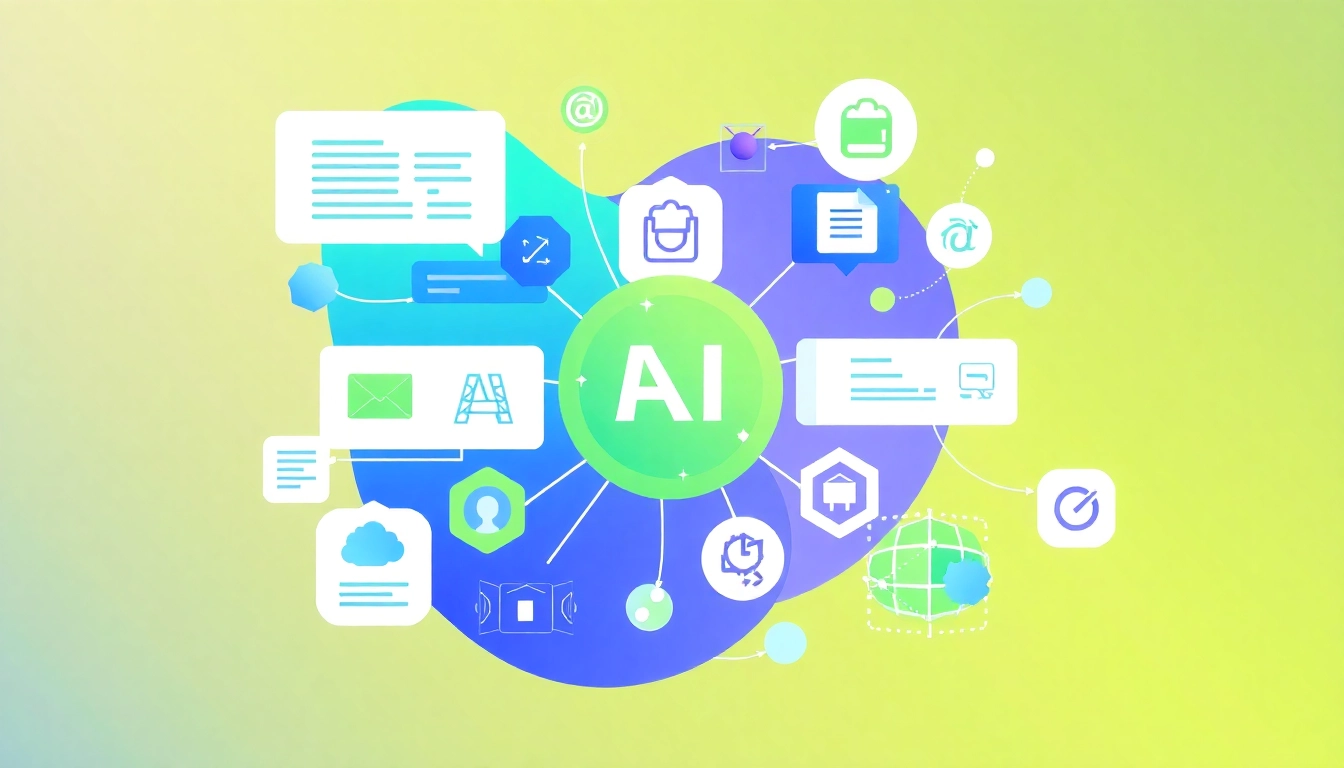Understanding AI Marketing Tools
What are AI Marketing Tools?
AI marketing tools are software solutions that leverage artificial intelligence to enhance and optimize marketing strategies. They are designed to automate processes, analyze data, and create content that resonates with target audiences. With advancements in AI technology, these tools have become pivotal in contemporary marketing practices, enabling businesses to streamline their operations and deliver personalized experiences to consumers. AI marketing tools primarily cover areas such as data analysis, content generation, customer relationship management (CRM), and social media management, making them indispensable for marketers looking to stay competitive in the digital space. By incorporating AI marketing tools, organizations can glean insights from vast amounts of data and leverage them for decision-making and strategy formulation.
Benefits of Using AI in Marketing
The integration of AI in marketing offers numerous advantages that can enhance business productivity and growth. Some key benefits include:
- Improved Efficiency: Automation of repetitive tasks allows marketers to focus on strategic initiatives, thereby improving overall productivity.
- Data-Driven Insights: AI tools can analyze large volumes of data in real-time, providing actionable insights that inform marketing strategies and decisions.
- Enhanced Personalization: AI enables highly targeted marketing campaigns tailored to individual consumer preferences and behaviors, increasing engagement and conversion rates.
- Cost Reduction: By streamlining processes and increasing efficiency, businesses can reduce marketing costs significantly.
- Predictive Analytics: AI algorithms can predict future trends based on historical data, allowing marketers to anticipate customer needs and market shifts.
Key Features to Look For
When selecting AI marketing tools, it’s crucial to consider several key features that can enhance their effectiveness:
- Data Integration: The ability to integrate with existing databases and platforms for a comprehensive view of marketing efforts.
- Machine Learning Capabilities: Tools should leverage machine learning for continuous improvement and adaptation to changing consumer behaviors.
- User-Friendly Interface: A simple and intuitive user interface is vital, as it allows for quick adoption and efficient use of the tool.
- Customizable Reporting: Flexibility in reporting features can help marketers tailor reports that match their specific needs and KPIs.
- Scalability: As businesses grow, their marketing tools should be able to scale alongside them, accommodating increased data and user demands.
Top AI Marketing Tools of 2025
Leading Tools for Content Creation
Content creation is an area where AI tools can greatly enhance efficiency and creativity. Here are some leading tools to consider:
- Jasper: An AI-powered writing assistant that generates high-quality content for blogs, social media, and more, making the content creation process faster and easier.
- Copy.ai: Known for creating marketing copy, this tool assists users in crafting engaging advertisements, product descriptions, and social media posts.
- Writesonic: An innovative tool that combines AI with a user-friendly platform to help marketers produce various forms of content in minutes.
- Grammarly: While primarily a grammar-checking tool, Grammarly’s AI capabilities can assist in enhancing writing by providing tone suggestions and style improvements.
- Surfer SEO: This tool integrates content optimization with SEO guidance, ensuring that the generated content ranks well in search engines.
Best Tools for Data Analysis
Data analysis is crucial for understanding market trends and consumer behavior. Here are some of the best AI tools for this purpose:
- Google Analytics 4: The latest iteration of Google Analytics uses AI and machine learning to provide insights into user interactions, helping marketers optimize their strategies.
- Pendo: This tool focuses on product analytics, providing insights into user engagement and behaviors that can inform strategic decisions.
- HubSpot: Beyond being a CRM, HubSpot offers robust analytics capabilities that help track marketing campaigns and customer interactions effectively.
- Tableau: Known for data visualization, Tableau uses AI to assist in deciphering complex data sets, allowing marketers to present insights in an accessible format.
- IBM Watson Analytics: Leveraging machine learning, Watson offers deep analytical insights that drive strategic marketing decisions.
Tools for Social Media Management
Social media is an essential component of modern marketing, and leveraging AI can elevate social media management. Here are leading tools:
- Hootsuite: An all-in-one social media management platform that uses AI to suggest optimal posting times and content improvements.
- Buffer: This tool helps marketers manage multiple social accounts and provides insights driven by AI to improve engagement metrics.
- Canva: Now equipped with AI-driven features, Canva allows users to create professional social media graphics quickly and easily.
- Sprout Social: With advanced social listening tools and analytics, Sprout Social aids marketers in crafting tailored social media strategies.
- FeedHive: An innovative tool designed for content recycling and post optimization, ensuring maximized engagement and reach.
Implementing AI Marketing Tools in Your Strategy
Steps to Integrate AI Tools Successfully
The implementation of AI marketing tools requires strategic planning and execution. Here are steps to integrate these tools effectively:
- Identify Needs: Start by analyzing your marketing strategy and determining which areas could benefit from AI tools.
- Set Clear Objectives: Define what you hope to achieve with AI tools, such as increased efficiency, improved targeting, or enhanced customer service.
- Choose the Right Tools: Research and select tools that align with your objectives and integrate well with your existing systems.
- Train Your Team: Provide thorough training for your marketing team to ensure they are comfortable using the new tools and understand their functionalities.
- Monitor Performance: Continuously measure the performance and impact of the AI tools on your marketing goals, making adjustments as necessary.
Common Challenges and Solutions
While AI marketing tools present numerous benefits, organizations may face several challenges during implementation, including:
- Resistance to Change: Employees may be hesitant to adopt new technology. Address this by emphasizing the value and efficiency AI brings to their roles.
- Data Privacy Concerns: Ensure compliance with data protection regulations and maintain transparency with customers regarding data collection and usage.
- Integration Issues: Selecting tools that seamlessly integrate with existing marketing platforms can mitigate compatibility issues.
- Skill Gaps: Offer opportunities for continuous learning and development to equip your team with the skills necessary to leverage AI tools effectively.
Measuring Success and ROI
To understand the effectiveness of AI marketing tools, it’s important to establish metrics for success and measure ROI accurately. Consider these approaches:
- Define KPIs: Establish key performance indicators (KPIs) that reflect both quantitative and qualitative aspects of your marketing efforts.
- Analyze Cost Savings: Calculate the time savings on tasks that were automated, translating them into cost savings over time.
- Track Conversion Rates: Assess how AI tools impact conversion rates across different campaigns and customer touchpoints.
- Customer Feedback: Regularly solicit feedback from customers to understand how AI-driven initiatives enhance their experience and satisfaction.
Case Studies: Success Stories with AI Marketing Tools
Small Business Success with AI
Small businesses have leveraged AI marketing tools to achieve remarkable growth. For instance, a local bakery implemented a social media marketing tool to automate posts and analyze customer engagement. As a result, they saw a 40% increase in foot traffic over six months by effectively targeting local customers with personalized promotions.
Large Enterprises and AI Implementation
Large enterprises have also successfully integrated AI tools into their marketing strategies. A global retail brand utilized a predictive analytics tool to forecast sales trends and customer preferences. By tailoring their campaigns based on insights from the tool, they achieved a 25% increase in online sales during the holiday season.
Sector-specific Use Cases
In the healthcare sector, AI marketing tools have transformed patient engagement strategies. A healthcare provider used AI-driven chatbots to answer patient inquiries and schedule appointments. This reduced the workload on their staff by 30% and improved patient satisfaction rates by making it easier for patients to access services.
Future Trends in AI Marketing Tools
Upcoming Innovations to Watch
The future of AI marketing tools holds exciting innovations that could redefine the industry’s landscape. Some trends to keep an eye on include:
- Advanced Personalization: AI will enable even more sophisticated levels of personalization, adapting marketing messages and content on a per-user basis in real-time.
- Voice Search Optimization: As voice search grows in popularity, AI tools will develop capabilities to optimize content specifically for voice-activated searches.
- Augmented Reality (AR): AI-driven AR tools will allow consumers to interact with products in new ways, providing immersive shopping experiences.
Predicted Market Movements
The AI marketing tools market is expected to continue its rapid growth, with more businesses recognizing the need to adopt these technologies. Increased competition among suppliers will likely lead to improved features and lower costs, making these tools accessible to a wider range of businesses.
Adapting to New Technologies
As technology continues to evolve, marketers must remain agile and be prepared to adapt their strategies accordingly. Continuous learning and openness to new technologies will be essential in leveraging AI for ongoing success in marketing.



